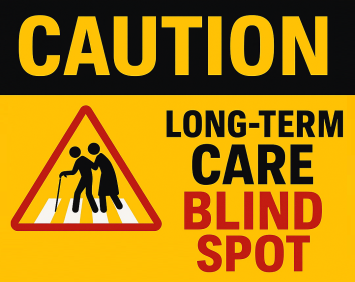The Psychology Behind The Long-Term Care Blindspot
Throughout the advisory community, everyone prides themselves on their level of expertise to confidently guide clients through market cycles, discussions about estate exemptions, maximizing the tax code, etc. However, regarding Long-Term Care (LTC) Planning, that confidence often masks a glaring blindspot that leaves millions of clients exposed to the risks professionals should help them avoid.
The blindspot isn't an oversight; it's the Kruger-Dunning effect, a cognitive bias in which individuals with limited knowledge or competence overestimate their understanding of a particular topic. And paradoxically, it tends to affect high-functioning professionals outside their core competence — not because they're not smart, but because they are smart. Smart enough to grasp pieces of a complex topic but not deep enough to realize how much they're missing. That's the LTC blindspot.
Regardless of the advisory role, there is a core competence at which most excel, whatever that may be, but unless there's experience working with care providers, coordinating care plans, structuring LTC insurance strategies, and walking families through the emotional and logistical chaos of a long-term care event, what qualifies them to claim "my clients are fine" without LTC planning. That's not a knock on their intelligence — it's a spotlight on a false sense of sufficiency where the Kruger-Dunning effect doesn't show up as "I don't know." It shows up as: "I know enough to make this recommendation on my own," or "I'm sure you'll be okay without a LTC plan," or "You have plenty of money, so you're covered."
The truth is that most in the advisory community talk about Long-Term Care without ever truly defining what it is. They don't begin by explaining that before 8:30 this morning, the client likely completed all six Activities of Daily Living (ADL) — used the toilet, bathed, got dressed, moved from room to room, made and ate breakfast — without assistance. They don't describe how losing the ability to do ADLs or developing a cognitive impairment triggers the need for care. They don't discuss how care usually starts at home, with a spouse or adult child struggling to lift dad out of bed, change mom's bedding daily, or coordinate other caregivers……They don't walk through what "real world" LTC actually looks like. When those fundamentals are skipped, there is never a complete understanding of the risks that need to be addressed; it's reduced to dollars rather than acknowledging that the real problem is the disruption of daily life, dignity, and independence.
In other words, it's confidence where caution is warranted and assumptions where inquiry is needed because even if it feels reasonable in the moment, it becomes a blindspot — one that isn't exposed until a family is scrambling, assets are being liquidated, or adult children are trying to figure out how to manage a parent's care from four states away…..This is the Kruger-Dunning effect inside advisory relationships, not in theory, but in practice.
In every other area of planning, boundaries are well-defined and respected. Financial advisors don’t file taxes unless they’re CPAs, CPAs don’t draft estate documents, estate attorneys don’t write investment policy statements, etc. But when it comes to Long-Term Care — a highly complex issue with health, family, tax, financial, and legal implications — suddenly everyone’s an “expert.” Yet, almost universally, the discussion is avoided. Why? Because most assume having access to money is enough when it’s not. LTC Planning isn’t just about the "pay for" — it’s about the "plan for" to protect the client, their family, their goals, and their autonomy when care is needed. If it’s not addressed early, it gets addressed in crisis mode, usually by someone unqualified and unprepared.
The irony is that the more skilled the professional, the more likely they are to assume they "have it covered." That's what makes this blindspot so persistent. The solution isn't adding more product knowledge or throwing in a brochure about insurance. It's understanding that Long-Term Care Planning requires interdisciplinary collaboration, humility about one's own limits, and the willingness to bring in experts who specialize in this critical, under-addressed area of risk.
When the LTC event occurs, as it will for most American families, clients' families won't remember your confidence. They'll remember whether you helped them plan for care. And if you didn't, they'll realize the Long-Term Care blindspot was yours, not theirs.
20250523

